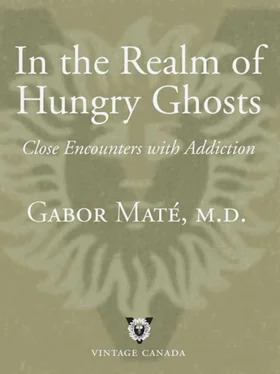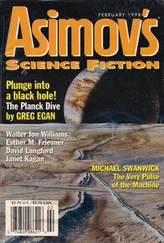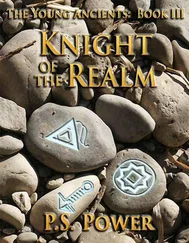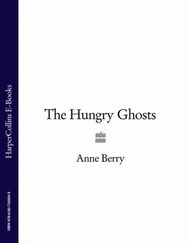
Trauma in the strict sense is not required for a young human being to suffer the loss of essence, the sense of oneness with all that is. Infants come into the world fully present and alive to every possibility, but they soon begin to shut down parts of themselves that their environment is unable to recognize or accept with love. As a consequence of that defensive shutdown, says the psychologist and spiritual teacher A.H. Almaas, one or more essential qualities such as love, joy, strength, courage or confidence may be suppressed. In its place, we experience a hole, a sense of empty deficiency. “People don’t know that the hole, the sense of deficiency, is a symptom of a loss of something deeper, the loss of essence, which can be regained. They think the hole, the deficiency, is how they really are at the deepest level and that there is nothing beyond it. They think something is wrong with them, something is basically wrong.” 6Such thoughts are not necessarily conscious but may take the form of unconscious beliefs. In either case, we develop behaviour patterns and emotional coping mechanisms to cover up the emptiness, mistakenly believing that the resulting traits represent our true “personality.” Indeed, what we call the personality is often a jumble of genuine traits and adopted coping styles that do not reflect our true self at all but the loss of it.
There are people who are not addicts in the strict sense, but only because their carefully constructed “personality” works well enough to keep them from the painful awareness of their emptiness. In such a case, they’ll be addicted “only” to a false or incomplete self-image or to their position in the world or to some role into which they sink their energy or to certain ideas that give them a sense of meaning. The human being with a “personality” that is insufficient to paper over the inner void becomes an undisguised addict, compulsively pursuing behaviours whose negative impact is obvious to him or to those around him. The difference is only in the degree of addiction or, perhaps, in the degree of honesty around the deficient self.
Spiritual work and psychological work are both necessary to reclaim our true nature. Without psychological strength, spiritual practice can easily become another addictive distraction from reality. Conversely, shorn of a spiritual perspective we are prone to stay stuck in the limited realm of the grasping ego, even if it’s a healthier and more balanced ego. Our soul-needs for meaning and connection remain unsatisfied. Therapy strives to make the deficient self stronger by uncovering the sources of a person’s emotional pain and releasing the rigid defensive patterns built up against it. Spiritual exploration ploughs the same ground but is less concerned with “fixing” or improving things than with rediscovering what is whole and has not been absent, just obscured. As Edmund Spenser wrote, “For there is nothing lost but may be found, if sought.” 7
What form of spiritual seeking a person chooses is determined by place, culture, belief and personal inclination. On this question there can be no prescriptions; nor would I be the one to provide them. In retrospect I can see that the God rage I trembled with as a small child was the beginning of my movement toward enlightenment, a goal that I may yet be far from attaining. I may have the equivalent of several Mount Everests left to scale, or perhaps I have only to reach out with my little finger to rend the veil of illusion between my soul and the most sacred realities. I cannot know and it’s useless to speculate. Being on the path is what’s important and we each need to tread a path on our own, no matter how many may have walked it before us. “Be a lamp onto yourselves,” the Buddha advised his followers, just as Jesus taught his disciples to seek the Kingdom of God within. I have found a way that feels right to me and I look to the teaching wherever I recognize it. The world has never lacked great spiritual guides, precepts and practices, but surely it has had a shortage of people willing to learn.

The ego’s tragic flaw is to mistake form for substance, surface illusion for reality. As long as the ego rules, we are all like the Hebrews who wandered the desert on their way to the Promised Land, “a stiff-necked people.” We keep rejecting truth, bow to the Golden Calf and scorn what would save us. As the present state of the planet indicates, we’re not fast learners, we human beings. Each generation must absorb the same lessons over and over again, groping its blind way through the realm of the Hungry Ghosts. The truth is within, which is why outward-directed attempts to fill in the void created when we lose touch with it cannot bring us closer to the serenity we long for. Late in the fourth century Augustine, Bishop of Hippo in what is present-day Algeria, wrote in his Confessions a passage that could be read today at any Twelve-Step gathering:
Unaware of my own needs, I resisted what would make me less needy…yet starvation did not make me hungry since my system rejected spiritual nourishment—I was not fed with it, and the more I starved, the more would nourishment make me queasy. My soul, sick and covered with sores, lunged outward instead, in a mad desire to scratch itself against some physical relief. 8
Spiritual awakening is no more and no less than a human being claiming his or her own full humanity. People who find themselves have no need to turn to addiction, or to stay with it. Armed with compassion, we recognize that addiction was the answer—the best answer we could find at one time in our lives—to the problem of isolation from our true selves and from the rest of creation. It’s also what keeps us gloomy, sad and angry. Not the world, not what’s outside of us, but what we hold inside traps us. We may not be responsible for the world that created our minds, but we can take responsibility for the mind with which we create our world. The addicted mind can project only a universe of grasping and alienation. “I just knew my little world and what I wanted was what I revolved around,” the newly abstinent cocaine user Judy once said. Many of us conduct our lives just in that way. It’s for us to choose consciously what world and what future we wish to live in.
Once a student’s eyes are open, instructors appear everywhere. Everything can teach us. Our most painful emotions point to our greatest possibilities, to where our authentic nature is hidden. People whom we judge are our mirrors. People who judge us call forth our courage to respect our own truth. Compassion for ourselves supports our compassion for others. As we open to the truth within, we hold safe a space of healing for others. They may do the same for us.
Healing occurs in a sacred place located within us all: “When you know yourselves, then you will be known.”
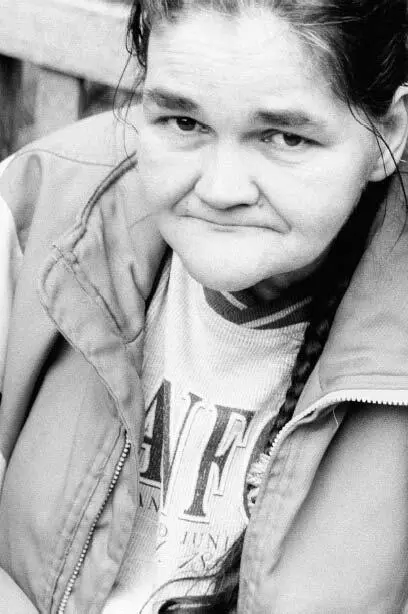
Memories and Miracles: An Epilogue

From hidden resources the miracle of survival renews itself with surprising force, as a geyser springs from underground waters through bare earth, shale and ice.
Standing by my desk one morning is Howard, leaning on a crutch to support his left leg. He is a burly, forty-year-old man whose adult life has been one prolonged jail sentence after another—twenty-two years in all. His childhood was a variation on a familiar theme.
Howard’s heroin-addicted mother was forced to leave her reserve after she married a Caucasian; she disappeared forever shortly before her son’s third birthday. He spent the next four years with his grandmother. “She gave me the most beautiful home,” he says. “I carry her in my heart. She’s the only reason why I’m still alive.” The grandmother died young, and with her died the little boy’s one earthly source of unconditional love and protection. Between his seventh year and his first prison term Howard’s course took him from one foster home or institution to another, beaten or sexually abused wherever he went.
Читать дальше
